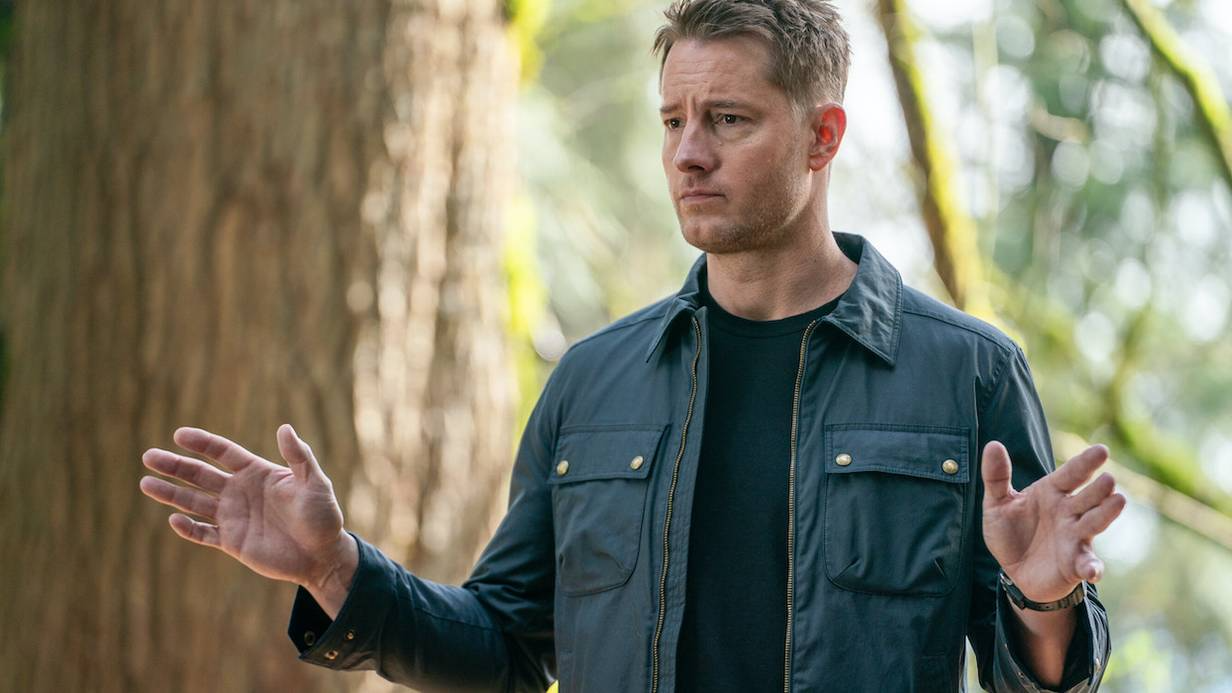
CBS’s Tracker has always thrived on suspense, but Season 3 is about to raise the stakes in a way fans never expected. Justin Hartley, who not only stars as Colter Shaw but also executive produces the series, revealed that the upcoming season will peel back the layers of Colter’s past like never before. And his exact words? “There’s some deep psychosis there.”
That chilling tease means viewers are in for a ride that’s not just about tracking cases it’s about uncovering the fractured psychology of a man haunted by trauma, secrets, and unresolved demons.
Colter Shaw: More Than Just a Tracker
Colter has always been the ultimate problem-solver, a survivalist who helps others when they’re most desperate. But behind his rugged exterior lies a man shaped by a volatile childhood and an upbringing that was anything but normal.
Season 3 doesn’t just remind us of that it forces us to confront it head-on. Hartley explained that the writers wanted fans to see why Colter is the way he is, and that means diving into territory that’s far darker than ever before.
What Does “Deep Psychosis” Really Mean?
When Hartley uses a phrase as intense as “deep psychosis,” it signals more than just personal conflict. This suggests Colter will wrestle with:
-
Hallucinations or memory distortions that blur reality.
-
Obsessive tendencies that make him push too far.
-
Unhealed trauma from his family’s disturbing past.
Instead of just being the calm, capable tracker we’ve come to admire, Colter may find himself unraveling in ways that could put both him and others in danger.
Season 3’s Promise: A Character-Driven Thriller
From Cases to Character
While Tracker has always balanced standalone cases with an ongoing storyline, Season 3 tilts the scales. The cases will still be gripping, but the real drama lies in Colter’s personal arc. We’ll see his choices influenced not just by instinct, but by trauma and fear.
A Deeper Look Into His Family
Much of Colter’s pain ties back to his complicated relationship with his late father and estranged siblings. Season 3 is poised to revisit that fractured family dynamic, exposing new secrets that may change how fans view Colter altogether.

Justin Hartley’s Perspective on the Role
Hartley admitted that Season 3 challenges him as both an actor and producer. Playing Colter means stepping into the mind of someone who has layers of trauma buried beneath a confident, problem-solving exterior.
“You can only run from your past for so long,” Hartley shared in a recent interview. “Colter’s been trying to bury his pain, but this season, it digs itself up whether he likes it or not.”
The Mystery of Colter’s Past
His Father’s Influence
Colter’s father was brilliant but troubled, raising his children in isolation and instilling in them both survival skills and paranoia. That upbringing created a man who thrives in chaos but struggles with intimacy and trust.
Unfinished Business With His Siblings
Earlier seasons teased Colter’s tense relationships with his family, but Season 3 promises to reveal moments that redefine those connections. Will they heal old wounds—or rip them wide open?
Why Trauma Makes Colter Compelling
Colter isn’t your cookie-cutter TV hero. He’s strong, yes, but he’s also broken. That duality makes him relatable and unpredictable. Fans love him because he’s not perfect—he’s human.
By diving into his psychosis, Tracker isn’t weakening its lead—it’s making him more fascinating. After all, the best heroes aren’t flawless; they’re the ones who wrestle with their scars.
Colter vs. Himself: The Real Conflict
In many ways, Colter’s biggest enemy isn’t the criminals he chases or the mysteries he solves—it’s himself. Season 3 will highlight that internal battle, showing how his mind can betray him even when his instincts are sharp.
Think of it this way: Colter may be able to track anyone, but can he track his way out of his own darkness?
The Emotional Toll of Season 3
Expect this season to feel heavier, darker, and more emotional. Instead of neatly wrapped cases, viewers will face questions without easy answers. We’ll see Colter struggle in ways that push him to his breaking point—and that vulnerability may either fracture him or make him stronger.
Fan Reactions: Excitement and Fear
Even before Season 3 airs, fans are buzzing online:
-
“If Colter really has psychosis, this could be the most powerful season yet.”
-
“Justin Hartley is about to destroy us emotionally, and I’m here for it.”
-
“I’m scared but excited—we’ve only scratched the surface of his past.”
Clearly, audiences are bracing themselves for a rollercoaster.
The Balance of Darkness and Hope
One fear fans have is that digging into psychosis could make Tracker too heavy. But Hartley reassured viewers that while this season goes dark, it also offers moments of hope, connection, and redemption. Colter isn’t just spiraling—he’s also learning, healing, and (maybe) finding peace.
How Tracker Is Redefining Network Drama
Most procedurals stick to formula. Tracker, however, isn’t afraid to blur lines between episodic storytelling and serialized character arcs. By weaving in Colter’s backstory with every new case, the show elevates itself from a traditional crime drama to something much more layered.
This evolution could be what cements its place as one of CBS’s most ambitious dramas in years.
Why Season 3 Could Be Colter’s Defining Chapter
With the promise of psychosis, trauma, and family revelations, Season 3 feels like the moment Tracker has been building toward all along. It’s where Colter’s past collides with his present—and where fans finally see the man behind the tracker.
Conclusion: Into the Mind of Colter Shaw
“There’s some deep psychosis there.” Justin Hartley didn’t mince words, and fans should take that seriously. Season 3 of Tracker won’t just entertain—it’ll unsettle, provoke, and challenge us to look at Colter in a whole new way.
For viewers, that means one thing: buckle up, because this season is going to be the most intense, emotional, and unforgettable ride yet.
FAQs
1. What does Justin Hartley mean by “deep psychosis” in Tracker Season 3?
He’s teasing a darker storyline where Colter’s past trauma and mental struggles play a major role.
2. Will Season 3 focus more on Colter’s personal life than cases?
Yes. While cases remain, the spotlight shifts heavily to Colter’s family history and inner demons.
3. Does this mean Colter is becoming unstable?
Not exactly—he’s still capable, but his unresolved trauma complicates his choices and relationships.
4. How will fans react to this darker tone?
Some may be shocked, but most are excited for a deeper, more emotional exploration of Colter.
5. Why is Season 3 so important to the show’s future?
It’s the season that defines Colter Shaw as more than a tracker—it shows him as a deeply human, flawed hero.
